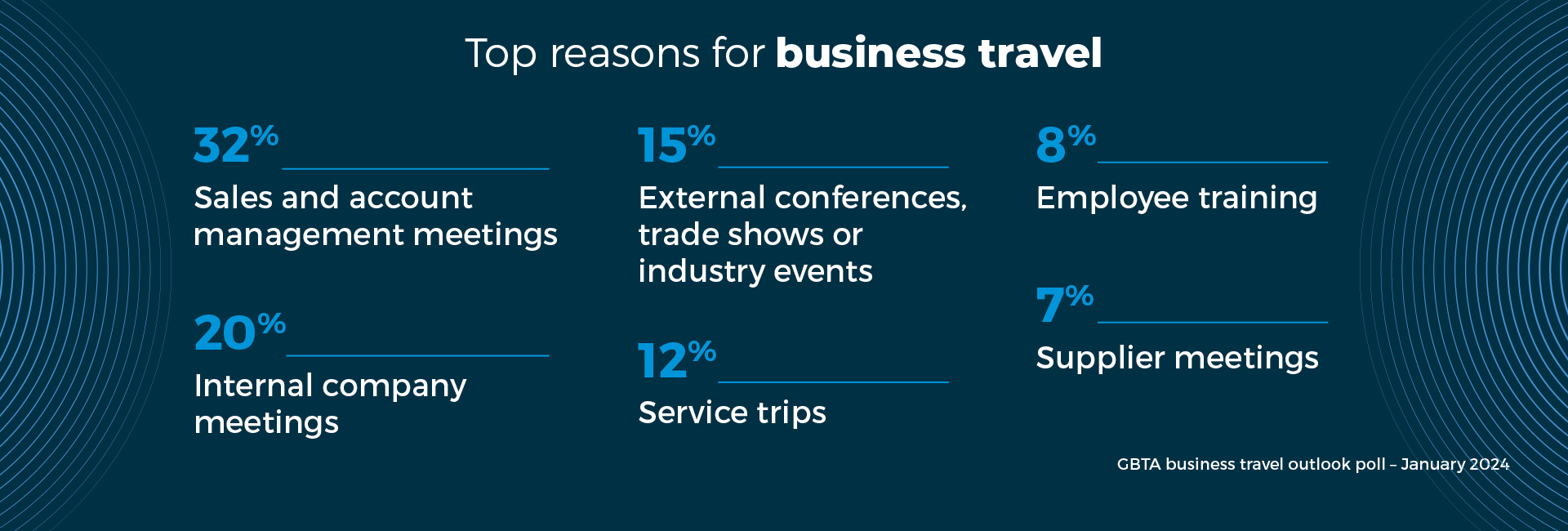

Why integrate business travel and meetings management?
In today’s dynamic business environment, where global connectivity and fast decision-making are paramount, the intersection of business travel and meetings management is becoming an important aspect of an organisational strategy. For years, the ideal has been to fully integrate the two.
Businesses acknowledge that the alignment of the two is not just a logistical need, but a strategic necessity. After all, we conduct travel to meet people; and the combined spend is coming from the same company budget, so why manage them separately?
The conventional approach of treating business travel and meetings management as separate entities can give way to a more integrated mindset, recognising the synergy between them. Let’s explore how aligning them to deliver one integrated travel program can deliver benefits.
The case for integration
The integration of business travel and meetings management into one travel program presents a compelling case for organisations seeking to navigate the challenges posed by recent price increases, shifting budget dynamics, risk management and sustainability goals. The fragmented responsibilities often seen in the split between procurement and those responsible for meetings and events can lead to disconnected communication strategies, budgets, and decision-making processes.
The case for integration is a real one, so let’s look at some of the areas for consideration.
Rising travel costs and spend allocations
The 2024 January GBTA Business Travel Outlook poll highlighted that 40% of respondents felt their corporate budgets were not keeping pace with travel costs. Different components of travel spend, such as sales meetings, internal company meetings, conferences, and service trips, make up various proportions of the overall budget.

Further, Knowland’s meeting planner survey highlights a potential increase in bookings and attendee numbers in 2024, which adds to the complexity of managing costs and resources efficiently.
Higher costs, in addition to increased forecasted bookings, highlight the opportunity to combine room night volumes and travel spend across corporate travel and meetings programs to deliver more competitive buying power with suppliers. Managing both business travel and meetings management expenses and reimbursements becomes complex when it is not centralised, necessitating a comprehensive approach to ensure budget optimisation.
Risk management
A company has the responsibility for the wellbeing of its travellers. Centralising travel data and bookings, irrespective of the purpose of the journey, provides an essential layer of security. This becomes particularly crucial when swift identification of travellers and their locations is necessary, especially for those who use a risk management company. Sharing traveller information becomes effortless, the risk management company can update risk assessments seamlessly, and notifying impacted travellers becomes a streamlined process. These tasks pose a greater challenge in fragmented travel programs. Adding another layer of complexity, these aspects are not always managed by a single travel management company.
ESG considerations
Environmental, social, and governance (ESG) factors are gaining importance for businesses and their employees. Integrating travel and meetings programs allows organisations to deliver consistently on their ESG objectives by promoting sustainable choices and responsible travel practices in every area of travel. This further emphasises the need for integrated programs that consider both business travel and meetings management.
Benefits of an integrated travel program
Implementing an integrated travel program yields immediate benefits that extend beyond cost savings. This unified approach maximises efficiency and impact across all travel-related activities.
- Streamlined processes
Utilising a travel management company that oversees both business travel and meetings management ensures policy control, optimises supplier deals, and provides robust traveller tracking capabilities. For example, Corporate Travel Management (CTM) and its specialist event management division Event Travel Management (ETM), provides businesses with a centralised approach to their corporate travel and meetings management, which enhances efficiency through the provision of consistent products and services. This not only streamlines processes but also increases satisfaction for both Travel and Event Managers, travellers and attendees.
- Improved policy compliance
An integrated approach not only streamlines processes but also promotes enhanced policy compliance. By seamlessly integrating various elements of travel management, this approach ensures that every travel-related activity aligns meticulously with the organisation’s established guidelines. Stakeholders can have greater confidence that all aspects of travel adhere to organisational standards, contributing to a more robust and well-regulated travel framework.
- Cost savings and negotiation power
Adopting a strategic approach to reduce the number of suppliers your business utilises can result in significant cost savings. By presenting corporate travel data overlapping with meetings and events programs during negotiations, organisations can capitalise on enhanced negotiating opportunities. An integrated travel program strategically optimises budgets, addressing immediate cost-saving opportunities and establishing a foundation for future supplier negotiations.
- Enhanced travel data visibility
The integrated program offers real-time visibility into travel data, capturing all spend, not just transient business travel. This comprehensive visibility supports better negotiation with suppliers, facilitates budget tracking and forecasting, and provides deeper insights into booking behaviours and policy compliance.
- Duty of care support
An integrated travel and events program supports enhanced duty of care by providing a structured framework for managing all travel-related risks and supporting the wellbeing of travellers. The use of risk management and traveller-tracking tools ensures a single source of truth, enabling a swift response and risk notifications when required.
- Clarity of travel supplier and support
Enabling an integrated travel and events program not only streamlines internal communications but also eliminates confusion regarding travel policy and process. This enhances the overall travel experience for business travellers and instils confidence in the reliability and expertise of the chosen travel management partner.

Time to redefine your company’s travel program strategy?
Companies increasingly realise the importance of optimising their supplier spending through an integrated business travel and meetings program.
A unified strategy provides tangible benefits, such as streamlined processes, enhanced negotiation power, improved travel data visibility, and heightened policy compliance. Beyond immediate cost savings, it represents a forward-thinking move to maximise efficiency and impact across all travel-related activities. Embracing an integrated travel program fosters innovation, collaboration, and comprehensive communication, laying the foundation for sustained efficiency and a future-ready business travel and meetings management strategy.
Witness the benefits of an integrated business travel and meetings management strategy.
Connect with CTM today.




